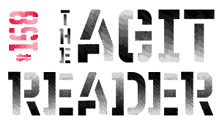
Rimar
by Kevin J. Elliott
Rimar is in the business of myth-making. We imagine what Rimar wants us to imagine. In a post-Kanye, post–Girl Talk environment, where every piece of source material is indelibly free and only a few mouse clicks away, a laptop auteur like Rimar has the ability to posit himself as a high profile producer, remixing celebrities from a million-dollar studio, when in reality he’s just another lonely soul, eternally high and horny, with an obsessive bedroom project. Higher Ground, the first offering from the 20-something California-born, Brooklyn by way of Columbus, Ohio musician, is a reflection of a time in sampled-based beat-music where the boundaries have been forever blurred. As such, songs like “Don’t Say” and “Drive Me Crazy” are luxurious escapes that mix everything from old-school homage to chillwave climes with the professional flare of mainstream hip-hop and R&B. These are jams that could play just as easily on a hipster’s mixtape next to Washed Out and Flying Lotus as they could next to the latest Drake mega-hit on a Hot 97 countdown. The effort needed to maintain that ambiguous anonymity is something Rimar seems acutely aware of, taking the buzz of the blogosphere for Higher Ground (which he’s given away for free) as insignificant accolades as opposed to fuel that may crown him as the next Weeknd. I recently contacted him right after his move from Columbus, where he was a relative unknown, to the East Coast, where the opportunities to share his gift have increased infinitely.
First of all, can you explain your history making music? Were you in more traditional bands before Rimar or have you always been focused on hip-hop and house?
Rimar: No, I’ve always been making beats. During high school, I spent a lot of time in my basement making songs. I used to spend entire days during the summer fucking around on my computer putting together samples, beats, and keyboarding melodies. I used to get paranoid being alone like that, spending hours alone immersed in droning sounds.
What do you think it was that first inspired you to be a musician?
R: Kanye’s College Dropout.
And when did you know that Rimar was something that would be bigger than expected?
R: I don’t consider this attention “big.” I have blogs, radios, and some interesting/cool individuals paying attention, but none of this really amounts to anything that I consider extremely major. I appreciate the people that enjoy what I do, and that’s all I really ever wanted: to connect with people via a medium where I can creatively translate how I feel. I’m thankful for any love I get from Higher Ground, especially when it’s from sexy women.
So far, is your music completely sample-based or are you creating some of the melodies and beats yourself?
R: I produce all the beats. All of the melodies and sounds are derived from bits and pieces of other songs. I keyboard in some of the melodies. “Flower Dress” is completely devoid of any samples, but usually I steal everything. It’s easier that way.
When you perform live, what is your usual set-up?
R: My laptop, an MPD, and a mic.
Do you see yourself incorporating live instruments or full-time vocals to Rimar?
R: I would love to have a live band playing with me. Some of my good friends are very talented instrumentalists, so once I get fired from my job, I’ll give them a call and we can go tour.
I noticed that you’ve already done a remix for Mario. Was that commissioned by the artist or something you did on your own accord? If it was on your own, why did you choose that song?
R: I chose to remix the song. I just enjoy it a lot. It’s so smooth, a very simple song, definitive of solid, commercial R&B. It’s both gorgeous and hilariously annoying at the same time. Plus, I love the way Mario’s voice acts as almost a supporting synth during the introduction of the song prior to the verse. It gave me a lot of opportunities to manipulate the samples.
Have you been approached by other artists to do more remixes?
R: Yes, I just finished one for Monster Rally, which should be out soon. I remixed his song “Sun Bum” off the Coral LP. I recently met up with him at his show at (Brooklyn venue) Glasslands this past weekend. He’s a very humble guy.
Do you think doing remixes takes away from making your own music or does it help the creative process?
R: With what I’m doing now—stealing samples—it’s pretty much the same as making my own music.
You’ve been compared to Frank Ocean and the Weeknd quite a bit, producers mostly known for making tracks for bigger names. Is making beats and music for other artists a goal of yours or is Rimar all you want to concern yourself with?
R: I love immersing myself in creative projects. Prior to Higher Ground, I was producing for hip-hop acts and R&B singers. I’m currently working on some tracks for Cities Aviv. I’ll take any opportunity I get to collaborate with artists I appreciate and enjoy. I’m not solely concerned with my solo work. For me, it’s just about making music. It’s something I genuinely enjoy doing.
These days, with the internet, it’s so easy for artists like you to find tons of accessible and rare source material. Do you think, in a way, it’s cheating as opposed to cratedigging or is it just a perk of technology and can only make the music better in the long run?
R: Sure, it’s completely cheating. Cratedigging was a product of the time, place, and emotional involvement of a very specific music production process. It’s completely esoteric to a faction of music producers, turntabilists and beat musicians utilizing it as homage to ’70s and ’80s hip-hop. How I make music and search for samples, in a way, completely shits on the art of cratedigging. I’m simply taking an easier direction of utilizing the internet to rip all of my music.
We’re in a generation where we completely live our lives online—sharing, finding, and giving content away for free to connect with individuals across the world. The internet is a limitless tool where I have access to any resource I could possibly want. Finding a song that I feel strongly enough about to sample is only a couple of links away. I think it completely takes away from the dated process of cratedigging, but in turn adds so much value. This free open source allows anyone and everyone to become an artist, which will only make art and music infinitely better.
You’ve moved from Columbus to New York. What prompted the move and what will you miss most about Ohio? Is that where you’re from originally?
R: I was born and raised in California. I moved to Columbus in high school. New opportunities brought me to New York City. There’s a lot I miss about Columbus, specifically friends, cheap and delicious food (Dirty Franks, North Market, the Dube), and extremely easy access to weed.
Final question, fill in the blanks:
In 10th grade, I was listening to ____, doing ____ in the ____ with ____, wishing I was ____.
R: In 10th grade I was listening to Usher doing lonely, sexual acts in the bathroom with my European, dirty mags, wishing I was not doing that and dreaming of being an accountant in the future.
PRIMITIVE FUTURES
Imaginary Softwoods, The Path of Spectrolite
Cheater Slicks, Our Food Is Chaos
An Interview with Purling Hiss
Hozac Summer 7-inches
The Men, Leave Home
Obnox, I'm Bleeding Now
June Singles Round-Up, Part 2
June Singles Round-Up, Part 1
A Missive from Evil Weevil
Wet Hair, In Vogue Spirit
Three New Singles from Florida's Dying
Skeletons, People
An Interview with the Feeling of Love
Tic Tac Totally Singles Round-Up
